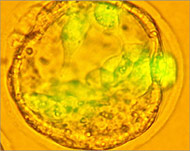US bans patenting of humans
US lawmakers have decided the country’s Patent Office will be barred from issuing patents on human organisms, such as genetically engineered embryos.

Representative Dave Weldon, a medical doctor who sponsored the provision to be included in a giant spending bill, said on Monday it would codify existing Patent Office rules that human organisms are not patentable subject matter.
An agreement was worked out with senators to make clear, in a report accompanying the provision, that the patent ban would not interfere with stem cell research, said Weldon.
The provision would ban patents for genetically engineered human embryos, foetuses and human beings. It would not affect patents on genes, cells, tissue and other biological products.
It would also not stop scientists from seeking patents for the procedures or methods of creating a biological product.
 |
|
Human embryonic stem cells |
US Patent and Trademark Office director James Rogan, in a letter last week to Senate Appropriations Committee Chairman Ted Steve, said his office viewed the Weldon amendment as “fully consistent with USPTO’s policy on the non-patentability of human life-forms”.
Weldon said in a recent floor speech that his amendment would leave the Patent Office free to address new or borderline issues.
As an example, he noted that the Patent Office does grant patents in cases where an animal has been modified to include a few human genes so it can produce a human protein or antibody.
Concerns
The Biotechnology Industry Organisation has voiced concerns about the amendment, saying the language is vague and would jeopardise many human-derived biotechnology inventions.
It warned that investors, fearing a lack of patent protection, would not invest when there is no clear definition of what encompasses a human organism.
“The biotechnology industry has been fighting this tooth and nail,” said Weldon.
The amendment last July was attached to the House version of a 2004 spending bill for the departments of Commerce, Justice and State. The bill is included in a package of unfinished spending bills that Congress is expected to approve and send to the president next week.